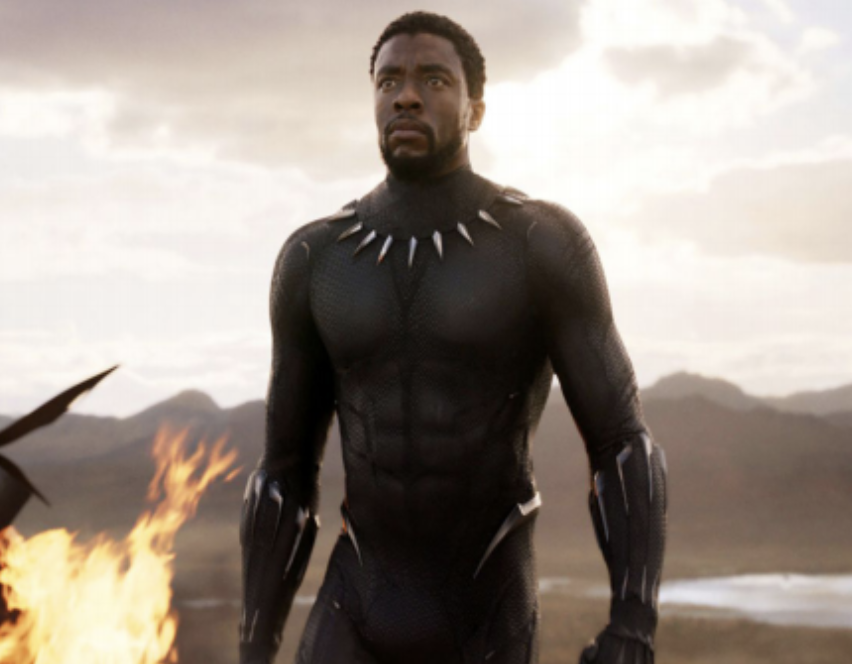“Rest in power, King”: In memory of Chadwick Boseman
September 27, 2020
The announcement of Chadwick Boseman’s death on Aug. 28 was met with tributes and remembrances through social media by millions of fans and distinguished members of the entertainment industry, athletic organizations and more.
Boseman was revered for being a virtuoso actor, one that studies his characters inside out to properly bring to life their widely varying quirks and personalities. He amazed audiences with his embodiments of the daring, admirable Jackie Robinson and the enigmatic, success-driven and somewhat tyrannical James Brown on the big screen. He became a NYPD detective, an Associate justice and a Vietnam war hero.
“Chadwick came to the White House to work with kids when he was playing Jackie Robinson,” former president Barack Obama wrote on Twitter. “You could tell right away that he was blessed. To be young, gifted, and Black; to use that power to give them heroes to look up to; to do it all while in pain – what a use of his years.”
Boseman uplifted the life stories of influential Black Americans in his portrayals, but perhaps the work that is most emblematic of black culture is “Black Panther”, a role that invited Boseman to Hollywood stardom.
The titular superhero was created by Jack Kirby and Stan Lee in 1966 and has been a point of discussion about the shifting perspectives on race and a critique on society ever since. Half a century later, production for the movie was reflective as a similar novelty to its source material. Boseman, director Ryan Coogler and most of the supporting cast including Angela Basset, Forest Whitaker and Lupita Nyong’o are all black. Its $201.7 million opening weekend challenged the narrative set by Hollywood that films with black leads are not successful with the public.
With America’s racial and political divide becoming an even larger issue than in the recent past, the representation of black people in a superhero movie resonates deeply with its targeted young audience. Indeed, the introduction of Black Panther in the superhero genre gave black children a character to relate and look up to, to base their own moral compass off of and to reassure them that it’s possible to create a positive change in the world.
The producers knew that the movie was going to be a cultural touchstone, bearing potential to become a phenomena that represented something greater than itself. Boseman’s contributions to the film behind and in front of the camera only boltered the film’s distinctiveness from other Marvel movies and blockbuster productions.
Boseman was adamant that the characters in “Black Panther” should use an accent based in the Xhosa language when Marvel Studios believed that the general audience would be put off and have trouble understanding the dialogue. Although only initially given the choice to take on either a British or American accent for the role, Boseman didn’t stop fighting for his beliefs.
“I said that would not be fine because if we did that, that would be saying that [Wakandans] had been colonized,” Boseman said.
Going through the trouble of arguing for an accent and the process of learning Xhosa to fully immerse himself in the character, Boseman allowed the film to stay faithful to its comics and embrace its deep cultural African roots. He believed that the Black Panther should speak like the people he rules, and his consideration for the movie, simply on behalf of the native authenticity of the setting, points to how much Boseman wanted the film to make an impact.
“Chadwick was special. A true original. He was a deeply committed and constantly curious artist,” fellow actor and “Avengers: Endgame” costar Chris Evans tweeted. “He had so much amazing work still left to create. I’m endlessly grateful for our friendship. Rest in power, King.”
“Black Panther” isn’t just a superhero movie. It’s a black movie.
Chadwick Boseman wasn’t just an inspiration. He was a hero in the black community and beyond. He was cast as the Black Panther not as an average crusader, but instead a symbol of the progress of the film industry. The movie set milestones in the box office and breaks down the myth that black-led films are too niche for mainstream enjoyment. Although Chadwick Boseman passed away at a young age, the impact of his work and lessons about acceptance and identity in his films live on.

























































